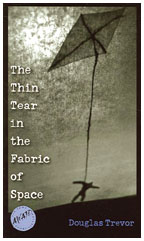January 25, 2006: Reading Room
Douglas Trevor ’92 dedicates his book to his sister, who died unexpectedly in 1998. (Sheri Seggerman) |
Exploring
grief
Douglas Trevor ’92 delves into loss in his debut
short story collection
By Maria LoBiondo
The common denominator in the nine stories in Douglas Trevor ’92’s debut short story collection is loss — of a loved family member, or of a former self. But while sadness haunts his characters, Trevor goes beyond this emotion to the deeper feelings that surface when loss, or a tear in the fabric of one’s life, rips security away.
The title story in The Thin Tear in the Fabric of Space, published in October by the University of Iowa, involves a professor facing her own mortality while mourning the loss of her lover. A young man in “Central Square” duplicates his deceased father’s decline into alcoholism, but finds redemption in Thoreau’s Walden and then seeks forgiveness from a Chilean woman he has wronged.
“I wanted to move the reader through the bewilderment of loss,” Trevor explains. “Grief is very hard to empathize with when others are experiencing it. It isolates the person experiencing it, unlike other emotions, like mirth, which connect us to others.”
 This
is territory the University of Iowa associate professor of English knows
well. He dedicated the book to his older sister, Jolee, who died unexpectedly
in 1998 of an aneurysm. “The experience of dealing with Jolee’s
death is behind every one of the stories,” he says. In writing them,
he sifted through “how your world changes when a contemporary dies,
how your view of the world shifts and never goes back.”
This
is territory the University of Iowa associate professor of English knows
well. He dedicated the book to his older sister, Jolee, who died unexpectedly
in 1998 of an aneurysm. “The experience of dealing with Jolee’s
death is behind every one of the stories,” he says. In writing them,
he sifted through “how your world changes when a contemporary dies,
how your view of the world shifts and never goes back.”
In the last, largely autobiographical story, “Fellowship of the Bereaved,” Jared, home from college for the first Christmas after his sister’s death, muses: “In the face of death, we become greedy for life: selfish and hoarding.”
“I’m interested in self-consciously descriptive characters,” Trevor explains. “I’m drawn to people who can recognize their own idiosyncrasies but who remain powerless to change them, in part because I think we’re all a little like that.”
Trevor began writing stories in elementary school — his sister was his illustrator — and dabbled in playwriting in high school. But it was as a comparative literature major at Princeton that he says he felt he became a writer, working with Joyce Carol Oates and delving into Paradise Lost with the late Earl Miner. He decided to balance an academic career with writing modern fiction, receiving a Ph.D. in English Renaissance literature at Harvard.
In 1999 he began teaching at the University of Iowa, and edited the literary journal Iowa Review for about three years. His scholarly field relates to his fiction writing by also focusing on emotions, specifically the exploration of emotions as portrayed in period texts such as Hamlet and other prominent works.
The Thin Tear in the Fabric of Space won the 2005 Iowa Short
Fiction Award, a national competition honoring first-time authors. Now
Trevor is developing one of the collection’s stories, “Girls
I Know” (selected for inclusion in The O. Henry Prize Stories 2006),
into a novel. ![]()
Maria LoBiondo is an occasional PAW contributor.
Neuroscientist Gregory Berns ’86 has studied chemicals released in the brain that make us feel satisfied. (HERBERT KUPER) |
What
do we really want?
Gregory Berns ’86 finds we crave challenge and novelty
Sitting on a beautiful sandy beach, with a good book in one hand and a cold drink in the other, sounds pretty good. No worries. No stress. Although most of us may think that that would make us content, think again, says Gregory Berns ’86. A neuroscientist who studies motivation, Berns believes that chasing such pleasures doesn’t get us what we really want. Instead, we would be better off seeking satisfaction. By satisfaction he means the feeling you get when you engage in a challenging and novel experience, be it taking up yoga, tackling a crossword puzzle, or learning how to play a musical instrument.
In his book, Satisfaction: The Science of Finding True Fulfillment, published by Henry Holt in September, Berns looks at the biology of satisfaction: what happens in the brain when we engage in challenging and novel experiences. He distinguishes satisfaction from happiness, the emotion we feel when something good happens to us, like winning the lottery. In fact, “a ton of research” has shown that money does not make most people happier, he says. Satisfaction is active; happiness is passive, says Berns, an associate professor of psychiatry and behavioral sciences at Emory University.
 The
pursuit of satisfaction, he says, is about self-growth — viewing
experiences in terms of growing as a person and learning something new
about the world or another human being. Those experiences, he says, might
not be pleasant and could be painful, but we grow in the process.
The
pursuit of satisfaction, he says, is about self-growth — viewing
experiences in terms of growing as a person and learning something new
about the world or another human being. Those experiences, he says, might
not be pleasant and could be painful, but we grow in the process.
Using brain-imaging technology, Berns and other scientists have identified the part of the brain in which two chemicals, dopamine and cortisol, interact and result in the feeling we associate with satisfaction. A burst of dopamine is released when people engage in something challenging and novel; cortisol is released when we do something stressful, such as public speaking or physical exercise. Our brains are hard-wired to crave novelty and dislike boredom, says Berns, who majored in physics at Princeton and earned a doctorate in biomedical engineering at the University of California, Davis, and a medical degree at the University of California, San Diego.
To bring greater meaning to data accumulated in the lab, Berns takes his readers into real life to hear from people engaging in challenging and stressful experiences. He meets a master chef while preparing a meal, visits a sadomasochism club in Atlanta to explore the connection between pleasure and pain, observes ultramarathoners during and after a race, and competes in a crossword puzzle tournament. After doing research in the field, Berns ultimately brings readers into his own bedroom, where he tries to introduce novelty into what had become a predictable sex life with his wife.
Berns isn’t suggesting we all run out to S&M clubs or run ultramarathons. A challenging and novel experience could be as simple as a biker taking a different route, or as risky as a spouse confronting her mate about sex. Berns admits that this craving for novelty is a moving target — after doing something for the first time, your brain adapts and loses that sense of newness.
Berns says, “The people who are most satisfied with what they
do are the ones who really lay it on the line and go for it.” ![]()
By K.F.G.
BOOK SHORTS
 Semper Fi in the Sky: The Marine Air Battles of World War II —
Gerald Astor ’47 (Presidio Press). Through oral history, the author
tells the stories of U.S. Marine pilots who flew in World War II. Included
are 2nd Lt. Alvin Jensen’s account of single-handedly destroying
24 grounded Japanese aircraft on Kahili, and Lt. John W. Leaper’s
story of sawing off a Kamikaze’s tail with his propeller over Okinawa.
Astor is a military historian.
Semper Fi in the Sky: The Marine Air Battles of World War II —
Gerald Astor ’47 (Presidio Press). Through oral history, the author
tells the stories of U.S. Marine pilots who flew in World War II. Included
are 2nd Lt. Alvin Jensen’s account of single-handedly destroying
24 grounded Japanese aircraft on Kahili, and Lt. John W. Leaper’s
story of sawing off a Kamikaze’s tail with his propeller over Okinawa.
Astor is a military historian.
 Messages to the World: The Statements of Osama Bin Laden —
edited and introduced by Bruce Lawrence ’62 (Verso). To better understand
Bin Laden, Lawrence has collected Bin Laden’s statements, interviews,
speeches, and video recordings since 1994 and situated them in their religious,
historical, and political context. Lawrence, a religion professor at Duke
University, shows how Bin Laden’s views draw on but also differ
from other strands of radical Islamic thought.
Messages to the World: The Statements of Osama Bin Laden —
edited and introduced by Bruce Lawrence ’62 (Verso). To better understand
Bin Laden, Lawrence has collected Bin Laden’s statements, interviews,
speeches, and video recordings since 1994 and situated them in their religious,
historical, and political context. Lawrence, a religion professor at Duke
University, shows how Bin Laden’s views draw on but also differ
from other strands of radical Islamic thought.
 Dictionary of Republicanisms: The Indispensable Guide to What They Really
Mean When They Say What They Think You Want to Hear — Katrina
Vanden Heuvel ’81 and the readers of The Nation (Nation
Books). Outraged by President Bush’s leadership, vanden Heuvel sets
out to debunk Republican political discourse in this satirical dictionary.
Among the definitions is “elitists, n.: Everyone who has NPR programmed
into their car-radio presets.” Vanden Heuvel is the publisher and
editor of The Nation.
Dictionary of Republicanisms: The Indispensable Guide to What They Really
Mean When They Say What They Think You Want to Hear — Katrina
Vanden Heuvel ’81 and the readers of The Nation (Nation
Books). Outraged by President Bush’s leadership, vanden Heuvel sets
out to debunk Republican political discourse in this satirical dictionary.
Among the definitions is “elitists, n.: Everyone who has NPR programmed
into their car-radio presets.” Vanden Heuvel is the publisher and
editor of The Nation.
 The Government Manual for New Superheroes — Matthew David
Brozik ’95 and Jacob Sager Weinstein ’94 (Andrews McMeel).
In this mock-official handbook, the authors offer zany advice for would-be
superheroes who want to develop the skills necessary to succeed as crime-fighting
crusaders. Readers learn how to construct a costume, maintain a secret
identity, and find a nemesis. Brozik is a writer and lawyer in New York.
Sager Weinstein, former staff writer for HBO’s Dennis Miller
Live show, lives in London.
The Government Manual for New Superheroes — Matthew David
Brozik ’95 and Jacob Sager Weinstein ’94 (Andrews McMeel).
In this mock-official handbook, the authors offer zany advice for would-be
superheroes who want to develop the skills necessary to succeed as crime-fighting
crusaders. Readers learn how to construct a costume, maintain a secret
identity, and find a nemesis. Brozik is a writer and lawyer in New York.
Sager Weinstein, former staff writer for HBO’s Dennis Miller
Live show, lives in London.
 Related Lives: Confessors and Their Female Penitents, 1450--1750 —
Jodi Bilinkoff *83 (Cornell University Press). In early modern Catholic
Europe, priests frequently developed close relationships with pious women,
serving as their spiritual directors and then their biographers after
their deaths. The author looks at how those priests related to their wealthy
female penitents. Bilinkoff is an associate professor of history at the
University of North Carolina at Greensboro.
Related Lives: Confessors and Their Female Penitents, 1450--1750 —
Jodi Bilinkoff *83 (Cornell University Press). In early modern Catholic
Europe, priests frequently developed close relationships with pious women,
serving as their spiritual directors and then their biographers after
their deaths. The author looks at how those priests related to their wealthy
female penitents. Bilinkoff is an associate professor of history at the
University of North Carolina at Greensboro.
 The Rise of American Democracy: Jefferson to Lincoln —
Sean Wilentz (W.W. Norton). The author chronicles the rise of democracy
and democratic principles in the United States from the Revolution to
the Civil War. Wilentz explores politics at the state and federal levels
in what a New York Times reviewer described as an “old-fashioned
narrative” that is “nothing less than monumental.” Wilentz,
a Princeton history professor, is a PAW board member.
The Rise of American Democracy: Jefferson to Lincoln —
Sean Wilentz (W.W. Norton). The author chronicles the rise of democracy
and democratic principles in the United States from the Revolution to
the Civil War. Wilentz explores politics at the state and federal levels
in what a New York Times reviewer described as an “old-fashioned
narrative” that is “nothing less than monumental.” Wilentz,
a Princeton history professor, is a PAW board member. ![]()
By K.F.G.
For a complete list of books received, click here.


